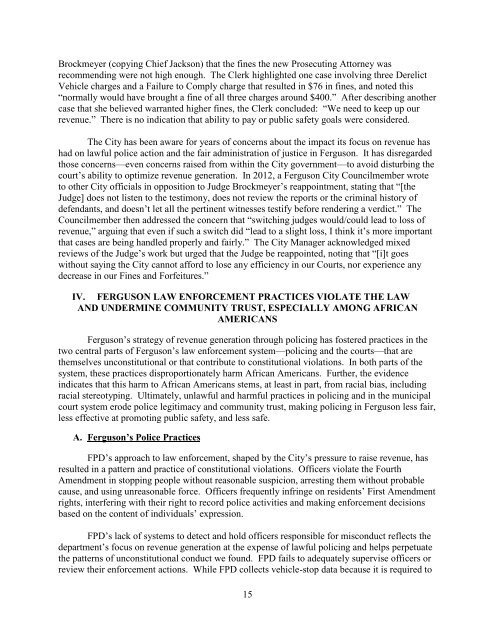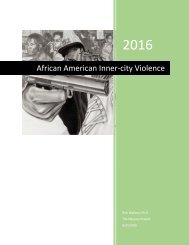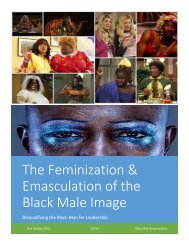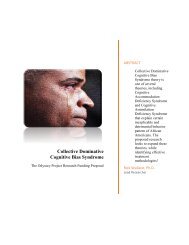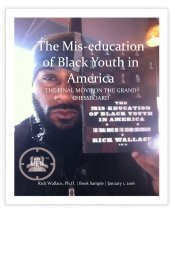U.S. Justice Department Report on the Ferguson Police Department
Ferguson’s law enforcement practices are shaped by the City’s focus on revenue rather than by public safety needs. This emphasis on revenue has compromised the institutional character of Ferguson’s police department, contributing to a pattern of unconstitutional policing, and has also shaped its municipal court, leading to procedures that raise due process concerns and inflict unnecessary harm on members of the Ferguson community.
Ferguson’s law enforcement practices are shaped by the City’s focus on revenue rather than by public safety needs. This emphasis on revenue has compromised the institutional character of Ferguson’s police department, contributing to a pattern of unconstitutional policing, and has also shaped its municipal court, leading to procedures that raise due process concerns and inflict unnecessary harm on members of the Ferguson community.
Create successful ePaper yourself
Turn your PDF publications into a flip-book with our unique Google optimized e-Paper software.
Brockmeyer (copying Chief Jacks<strong>on</strong>) that <strong>the</strong> fines <strong>the</strong> new Prosecuting Attorney was<br />
recommending were not high enough. The Clerk highlighted <strong>on</strong>e case involving three Derelict<br />
Vehicle charges and a Failure to Comply charge that resulted in $76 in fines, and noted this<br />
“normally would have brought a fine of all three charges around $400.” After describing ano<strong>the</strong>r<br />
case that she believed warranted higher fines, <strong>the</strong> Clerk c<strong>on</strong>cluded: “We need to keep up our<br />
revenue.” There is no indicati<strong>on</strong> that ability to pay or public safety goals were c<strong>on</strong>sidered.<br />
The City has been aware for years of c<strong>on</strong>cerns about <strong>the</strong> impact its focus <strong>on</strong> revenue has<br />
had <strong>on</strong> lawful police acti<strong>on</strong> and <strong>the</strong> fair administrati<strong>on</strong> of justice in Fergus<strong>on</strong>. It has disregarded<br />
those c<strong>on</strong>cerns—even c<strong>on</strong>cerns raised from within <strong>the</strong> City government—to avoid disturbing <strong>the</strong><br />
court’s ability to optimize revenue generati<strong>on</strong>. In 2012, a Fergus<strong>on</strong> City Councilmember wrote<br />
to o<strong>the</strong>r City officials in oppositi<strong>on</strong> to Judge Brockmeyer’s reappointment, stating that “[<strong>the</strong><br />
Judge] does not listen to <strong>the</strong> testim<strong>on</strong>y, does not review <strong>the</strong> reports or <strong>the</strong> criminal history of<br />
defendants, and doesn’t let all <strong>the</strong> pertinent witnesses testify before rendering a verdict.” The<br />
Councilmember <strong>the</strong>n addressed <strong>the</strong> c<strong>on</strong>cern that “switching judges would/could lead to loss of<br />
revenue,” arguing that even if such a switch did “lead to a slight loss, I think it’s more important<br />
that cases are being handled properly and fairly.” The City Manager acknowledged mixed<br />
reviews of <strong>the</strong> Judge’s work but urged that <strong>the</strong> Judge be reappointed, noting that “[i]t goes<br />
without saying <strong>the</strong> City cannot afford to lose any efficiency in our Courts, nor experience any<br />
decrease in our Fines and Forfeitures.”<br />
IV. FERGUSON LAW ENFORCEMENT PRACTICES VIOLATE THE LAW<br />
AND UNDERMINE COMMUNITY TRUST, ESPECIALLY AMONG AFRICAN<br />
AMERICANS<br />
Fergus<strong>on</strong>’s strategy of revenue generati<strong>on</strong> through policing has fostered practices in <strong>the</strong><br />
two central parts of Fergus<strong>on</strong>’s law enforcement system—policing and <strong>the</strong> courts—that are<br />
<strong>the</strong>mselves unc<strong>on</strong>stituti<strong>on</strong>al or that c<strong>on</strong>tribute to c<strong>on</strong>stituti<strong>on</strong>al violati<strong>on</strong>s. In both parts of <strong>the</strong><br />
system, <strong>the</strong>se practices disproporti<strong>on</strong>ately harm African Americans. Fur<strong>the</strong>r, <strong>the</strong> evidence<br />
indicates that this harm to African Americans stems, at least in part, from racial bias, including<br />
racial stereotyping. Ultimately, unlawful and harmful practices in policing and in <strong>the</strong> municipal<br />
court system erode police legitimacy and community trust, making policing in Fergus<strong>on</strong> less fair,<br />
less effective at promoting public safety, and less safe.<br />
A. Fergus<strong>on</strong>’s <strong>Police</strong> Practices<br />
FPD’s approach to law enforcement, shaped by <strong>the</strong> City’s pressure to raise revenue, has<br />
resulted in a pattern and practice of c<strong>on</strong>stituti<strong>on</strong>al violati<strong>on</strong>s. Officers violate <strong>the</strong> Fourth<br />
Amendment in stopping people without reas<strong>on</strong>able suspici<strong>on</strong>, arresting <strong>the</strong>m without probable<br />
cause, and using unreas<strong>on</strong>able force. Officers frequently infringe <strong>on</strong> residents’ First Amendment<br />
rights, interfering with <strong>the</strong>ir right to record police activities and making enforcement decisi<strong>on</strong>s<br />
based <strong>on</strong> <strong>the</strong> c<strong>on</strong>tent of individuals’ expressi<strong>on</strong>.<br />
FPD’s lack of systems to detect and hold officers resp<strong>on</strong>sible for misc<strong>on</strong>duct reflects <strong>the</strong><br />
department’s focus <strong>on</strong> revenue generati<strong>on</strong> at <strong>the</strong> expense of lawful policing and helps perpetuate<br />
<strong>the</strong> patterns of unc<strong>on</strong>stituti<strong>on</strong>al c<strong>on</strong>duct we found. FPD fails to adequately supervise officers or<br />
review <strong>the</strong>ir enforcement acti<strong>on</strong>s. While FPD collects vehicle-stop data because it is required to<br />
15


